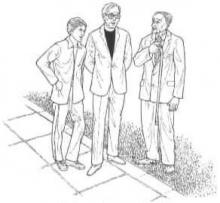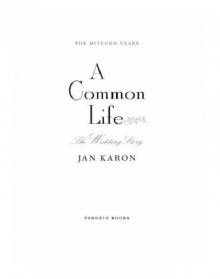Somewhere Safe With Somebody Good Read online
MITFORD BOOKS BY JAN KARON
At Home in Mitford
A Light in the Window
These High, Green Hills
Out to Canaan
A New Song
A Common Life
In This Mountain
Shepherds Abiding
Light from Heaven
Esther’s Gift:
A Mitford Christmas Story
The Mitford Snowmen
Jan Karon’s Mitford Cookbook & Kitchen Reader:
Recipes from Mitford Cooks, Favorite Tales from Mitford Books
The Mitford Bedside Companion:
Essays, Family Photographs, Favorite Mitford Scenes, and Much More
FATHER TIM BOOKS BY JAN KARON
Home to Holly Springs
In the Company of Others
Patches of Godlight:
Father Tim’s Favorite Quotes
A Continual Feast:
Words of Comfort and Celebration, Collected by Father Tim
CHILDREN’S BOOKS BY JAN KARON
Jeremy: The Tale of an Honest Bunny
Miss Fannie’s Hat
The Trellis and the Seed:
A Book of Encouragement for All Ages
G. P. PUTNAM’S SONS
Publishers Since 1838
Published by the Penguin Group
Penguin Group (USA) LLC
375 Hudson Street
New York, New York 10014
USA • Canada • UK • Ireland • Australia • New Zealand • India • South Africa • China
penguin.com
A Penguin Random House Company
Copyright © 2014 by Jan Karon
Penguin supports copyright. Copyright fuels creativity, encourages diverse voices, promotes free speech, and creates a vibrant culture. Thank you for buying an authorized edition of this book and for complying with copyright laws by not reproducing, scanning, or distributing any part of it in any form without permission. You are supporting writers and allowing Penguin to continue to publish books for every reader.
Library of Congress Cataloging-in-Publication Data
Karon, Jan, date.
Somewhere safe with somebody good: the new Mitford novel / Jan Karon.
p. cm.—(Mitford; 10)
ISBN 978-0-698-14140-7
1. Kavanagh, Timothy (Fictitious character)—Fiction. 2. Mitford (N.C.: Imaginary place)—Fiction. 3. Clergy—Fiction. 4. Episcopalians—Fiction. 5. Christian fiction. I. Title.
PS3561.A678S66 2014 2014012105
813'.54—dc23
This is a work of fiction. Names, characters, places, and incidents either are the product of the author’s imagination or are used fictitiously, and any resemblance to actual persons, living or dead, businesses, companies, events, or locales is entirely coincidental.
Version_1
For the young men and women of Grandfather Home for Children
www.grandfatherhome.org
I know the plans I have for you, says the Lord, plans for good and not for harm, to give you a future and a hope.
—JEREMIAH 29:11
Heartfelt thanks to Candace Freeland, First Reader; Brenda Furman, Scrabble Queen; The Right Reverend Frank S. Cerveny; Chief Eric Brown; Polly Hawkes; Dan Caton; John Grotberg; Mayor J. B. Lawrence; Jenny Dixon; Gerry Newman; Tom Fenstermaker; Brad Van Lear; Terry Pate; Professor Dale Brown; Dr. Neal Kassell; Dr. Mary Laughlin; Bonnie Setzer; Margery Daniel; Father Peter Way; Cathy Kane and the many devoted Mitford readers who cheered this book on; Dr. Lee Kassell; Dr. David Burt; Buck Bland; Becky Dyer; Barbara Bush Foundation for Family Literacy; Dr. Daniel Bara; Steve Pekary; Lieutenant Angel Mahaffey; Dr. Leslie Olsakovsky; Carolyn Wilson; Paul Richardson; Reverend Gale Cooper; Beth Tyree; Julie Arbelaez; Steve (‘Mr. Wilson’) Wilson; Mike Wilcox; Dr. George Grant; Dr. Elizabeth Hazelgrove; Robert and Lottie May Hazelgrove; Amanda Cempre; Bobby Ball, Dr. Ross, and Carol Rhoads; Donald and Elise Orenstein; Carolyn Schaefer; Jerry and Rosalind Richardson (‘Go, Defense!’ forever); Father Randall Haycock; Christina Ball; Jerry Torchia; Dr. Diane Snustad.
Boundless thanks to all who reread the entire Mitford series to prepare for the reading of Somewhere Safe with Somebody Good; and to Dr. Charles (Bunky) Davant; Dr. Christopher Holstege, Mark Ratzlaff, and Ray Russell.
Remembering our beloved Margaret Ann Lehmann (1944–2013).
Contents
Mitford Books by Jan Karon
Title Page
Copyright
Dedication
Acknowledgments
Epigraph
Map
Chapter One
Chapter Two
Chapter Three
Chapter Four
Chapter Five
Chapter Six
Chapter Seven
Chapter Eight
Chapter Nine
Chapter Ten
Chapter Eleven
Chapter Twelve
Chapter Thirteen
Chapter Fourteen
Chapter Fifteen
Chapter Sixteen
Chapter Seventeen
Chapter Eighteen
Chapter Nineteen
Chapter Twenty
Chapter Twenty-one
Chapter Twenty-two
Chapter Twenty-three
Chapter Twenty-four
Chapter Twenty-five
Chapter Twenty-six
Chapter Twenty-seven
Chapter Twenty-eight
Chapter Twenty-nine
Chapter Thirty
Oh, the inexpressible comfort of feeling safe with a person: having neither to weigh thoughts nor measure words, but to pour them out. Just as they are—chaff and grain together, knowing that a faithful hand will take and sift them, keep what is worth keeping, and then with the breath of kindness, blow the rest away.
—DINAH MARIA (MULOCK) CRAIK, 1826–1887
Chapter One
His wife was determined to march him to the country club this Saturday evening. Worse, he’d have to stuff himself into his old tux like sausage into a casing.
The Irish breakfast—more properly, a resplendent banquet on a plate—was the culprit. He had tried to restrict himself to three such repasts during their stay in County Sligo, but ended up devouring seven, two of them out of view of his wife. He didn’t know about Saint Paul, but the grim baggage of diabetes was definitely this cleric’s thorn.
‘I’m still jet-lagged,’ he said.
‘Jet-lagged? After ten days? Try again, sweetheart.’
There was a busy silence. They sat in his study, finishing a second cup of coffee. Rain gleamed on the leaves of the maple outside the vast window; fog capped the mountains beyond. ‘Our observatory,’ he reasoned, when faced with the alarming cost of so much glass.
‘It’s an important occasion, Timothy. Your doctor is retiring after decades of sleep loss and patients who won’t do what the doctor ordered.’
So? Hardly anyone ever did what the priest ordered, either.
‘Then he’s volunteering to serve in one of the worst areas of famine in the world.’
She pressed her case as he wrestled an unsettling truth—with Hoppy Harper out of the picture, he would fall into the hands of Dr. Wilson, who, in his opinion, was yet the unlicked cub, medically speaking.
‘And Father Timothy Kavanagh,’ she said, ‘highly esteemed friend and longtime priest of the guest of honor, wants to sit home.’ The cocked head, the raised ey
ebrow, the gathering of hoarfrost.
‘You’re absolutely right,’ he said.
‘So you’re going!’
‘Cynthia, Cynthia. I didn’t say I’m going, I said you’re right that I want to sit home.’ He gave forth a sigh.
‘You’re so southern.’
His Massachusetts-born spouse was keen on the notion that southerners were over-fond of sighing, something apparently beneath the dignity of Yankees. ‘You won the war,’ his father would have said, ‘what’s to sigh about?’
Did she have so much time on her hands that she could spend it conducting his business? Since she had started a new book, she should be insensible to life’s vagaries for at least ten or eleven months.
‘I just read an article,’ she said, ‘on what can happen to priests when they retire. Some of them end up refusing to leave the house.’
‘I have left the house religiously,’ he said with feeling.
And there she went, hooting with laughter. It was very hard to have a dispute with a woman who wouldn’t stay aggrieved, but was ever looking to put a shine on things.
‘I suppose it doesn’t count,’ he said, ‘that I went to see Hoppy on Tuesday and we had a long talk and I prayed for him and wished him well and promised we’d stay in touch with Olivia and Lace whenever he’s away.’ He watched her eyes; this was clearly not enough.
‘I gave him a nice pair of nail clippers,’ he said. No need to say it was a pass-along gift from his cousin. ‘In a leather case.’
The blank look.
‘That was lovely, I’m sure, but it will honor him to have people there, like at a funeral. How would you feel if no one came to your funeral because they’d already said lovely things before you croaked?’
‘Okay, okay, I’ll do it. Peace be with you, Kav’na. Where are my studs?’
‘In the right-hand section of your top bureau drawer. And also with you.’
He thought she looked pretty pleased with herself.
• • •
HE HEADED UPSTAIRS to try on the tux, to look Veracity in the face, and assemble the required paraphernalia.
His dog lay sprawled and oblivious on the landing, warming himself in a patch of sunlight.
Barnabas raised his head, blinked.
Soon, he would have to move the Old Gentleman down to the study, as stairs were increasingly nonnegotiable for his twelve-year-old Bouvier/Irish wolfhound. He had put off doing it; it would be unsettling for all, even for his wife’s cat, Violet.
When Cynthia moved into his bed on their wedding night, Barnabas, ever sensible of common courtesy, had excused himself to the hall and staked new territory. Later, when they moved from the rectory to her house next door, Barnabas again established his night watch in the hall. Even with the increase of arthritis in his hind legs, he had lately made it home base, declining any comforts offered on the ground floor.
Perhaps he would engineer the shift today—carry down the water bowl, the dog bed and blanket, the raccoon with the stuffing gone. He squatted on his haunches, gave a good scratch beneath the wiry coat.
‘What do you think, buddy?’
Barnabas gazed at him, solemn—morning light picked out flecks of amber in the dark pupils.
He couldn’t do it today. He could not. They would make the trek again tonight, downstairs for food and a trip to the hedge, and up again, slowly, each step a challenge and then a small triumph. Tomorrow, then.
He stood, trying to focus his attention on the blunt instrument of retirement and how and why the blow still left him reeling. Five years had passed since he’d departed the active priesthood, and as busy as he’d remained, the stunned sense of loss or deficit wouldn’t entirely go away. Cynthia was right. If he didn’t keep after himself, he could easily disappear into his armchair in the study and not be found again. ‘To withdraw someplace,’ read a sixteenth-century definition of retirement, ‘for the sake of seclusion.’
Retirement, of course, hadn’t been his idea—he had been urged by his doctor for health reasons. Cynthia had agreed and in the end, so had he.
As for his retiring doctor, Hoppy was as fit as a forty-year-old with no such health reasons. Weren’t doctors, like clergy, called to run the race to the all-consuming end? Only then could the crown of laurels be legitimately received. In his own case, diabetes, overwork, and stress had forced him out to pasture at age sixty-five, though he’d supplied pulpits hither and yon ever since.
He remembered how things had progressed. When his bishop announced to the parish the news of Tim Kavanagh’s retirement after sixteen years as the chief laborer in their vineyard, he observed more than a few mouths dropping open like the doors of roadside mailboxes. He heard a sharp intake of communal breath, primarily on the gospel side; a polite handkerchief or two fluttered out. That was expected.
Following the initial shock, however, came something altogether unexpected: their yawning indifference.
At the coffee hour, everyone crowded around, laughing, slapping him on the back and wishing him all the best, and then, like a shot, they fled home to their pot roast, as if no central loss had just occurred.
Where were the emotional breakdowns he’d dreaded, or even, perhaps, guiltily fancied? Where was the long, mournful line at the end of the service, with at least one or two flinging themselves upon him, possibly sobbing, and begging a reversal of this cruel decision?
Dream on. In truth, it was goodbye, Charlie, and have a swell time lounging around the house in your sock feet.
No one had warned him that something quite other would follow. On the heels of indifference came their anger and resentment. The sheer insult of his retirement raced along Main Street like a brush fire—oh, yes, he remembered.
In the how-could-you category, there was everything from the pained look and refusal to wish him a decent good morning, to full-blown righteous indignation. He was theirs, he belonged to them, they had got used to him, and now they were forced to go searching about for a total stranger, never a pleasant task, and God only knows what they’d come up with in this day and time. And it wasn’t just his parishioners, but the Baptists, the Presbyterians, the Methodists, and every other Tom, Dick, and Harry who felt wantonly betrayed. A veritable Benedict Arnold, he skulked along in the shadows for weeks before the whole thing blew over and they liked him again. Small wonder that retired clergy refused to leave the house.
This missionary impulse of Hoppy’s was, of course, noble; he, Timothy, had had such impulses himself—but wasn’t being a small-town doctor in today’s world noble enough for anybody?
He fought his way to the rear of their overstuffed closet that was once, they suspected, a nursery, and, in the dim light of the bulb they’d been meaning to convert to a blinding spotlight, found the morose thing in its dusty wrap. He took the wrap off, sneezed, and dragged the tux into their bedroom.
He laid it on the bed and stared at it, unseeing. When was their last black-tie affair?
Miss Sadie’s party for the newly wed Harpers, of course. How extraordinary that the frugal Miss Sadie had done such a wondrous and extravagant thing, even having Fernbank’s shut-away ballroom restored for the occasion. He recalled tables shining with crystal and silver, the music of the eight-piece orchestra, the coved ceiling swarmed by painted angels with gilded wings—and all of it bathed in the glimmer of candlelight. It had been an evening unlike anything Mitford had ever seen, and would almost certainly never see again.
He took the pants off the hanger, inspired. All would be well—the tux would be a tad form-fitting and in need of pressing, but nothing more; he was overreacting.
He glanced toward the corner of their room at the full-length mirror, which presented Absolute Truth morning, noon, and night, whether you wanted it or not. Indeed, unless the need to know was critical, he seldom looked into it.
The need being critical, he shucked out of
his clothes and walked to the mirror in his shorts and socks.
It was an inarticulate sound, like a small animal surprised in the woods.
Heaving a fairly shuddering sigh, he set about doing what had to be done. The pants wouldn’t zip all the way, much less button; any promise the jacket might have afforded was nil; and the cummerbund, albeit with Velcro, was toast.
He went to the bedroom door and closed it. This wasn’t something he wanted even his dog to witness. As for Saturday night, it was obvious that he wasn’t meant to leave the house.
• • •
HE FOUND CYNTHIA in the kitchen and confessed only ‘a slight gain since Miss Sadie’s party nearly a decade ago, but enough to, you know . . .’
‘I can let it out,’ she said. As far as he knew, she had never used a needle in her life. Having Cynthia Kavanagh do his alterations was as reckless as letting their son, Dooley, cut his hair.
‘Puny could help,’ she said, earnest. ‘She’s very good at that sort of thing.’
‘We don’t have a sewing machine,’ he said.
‘Right next door! Remember Hélène has a sewing machine. It’s in the living room by the piano, with all those sheets of music stacked on it. Maybe Hélène sews.’
‘People who sew don’t stack things on top of the machine.’ He knew that much, for Pete’s sake. ‘Besides, it’s an antique, it doesn’t actually work.’ His sense of doom was literally breathtaking.
‘We would use it over there,’ she said, oblivious. ‘It would be too heavy to carry through the hedge. It was her grandmother’s.’
‘Have you ever . . . ?’
‘Never. I would only show Puny or Hélène the inseams and tell them how much to let out. They would do the rest.’
For years, Puny Guthrie had kept house for him as a bachelor and thereafter for the two of them, yet he’d never heard her mention any sewing skills she may possess.
‘Have you checked the inseams?’ he asked.
‘I’ll go up and do it now. Where is it? And by the way, it’s time for your raisins.’

 A Light in the Window
A Light in the Window Somewhere Safe With Somebody Good
Somewhere Safe With Somebody Good In This Mountain
In This Mountain In the Company of Others
In the Company of Others Come Rain or Come Shine
Come Rain or Come Shine To Be Where You Are
To Be Where You Are These High, Green Hills
These High, Green Hills Light From Heaven
Light From Heaven A New Song
A New Song Home to Holly Springs
Home to Holly Springs The Mitford Bedside Companion
The Mitford Bedside Companion At Home in Mitford
At Home in Mitford Shepherds Abiding
Shepherds Abiding Out to Canaan
Out to Canaan A Common Life: The Wedding Story
A Common Life: The Wedding Story Jan Karon's Mitford Years
Jan Karon's Mitford Years